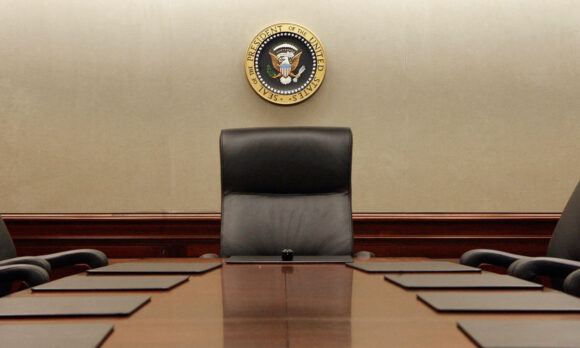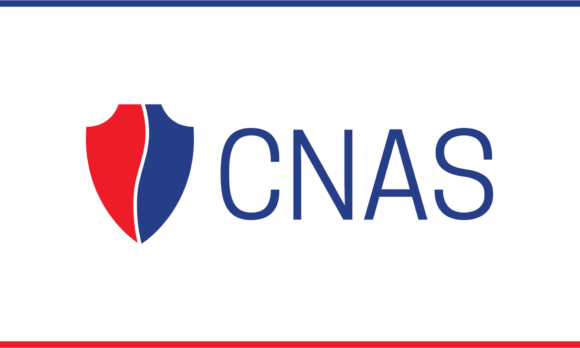February 17, 2021
Sharper: National Security's Next Generation
Analysis from CNAS experts on the most critical challenges for U.S. foreign policy.
In the federal national security workforce, "young talent—a key source for innovation and fresh thinking—is wildly underrepresented," expert Loren DeJonge Schulman warns. As the United States confronts a range of global issues, the need to amplify new and diverse voices in national security policymaking has never been clearer. CNAS is committed to meeting future foreign policy challenges by equipping a new generation of national security leaders. Continue reading this edition of Sharper to explore the Center's initiatives, research, and agenda for strengthening diversity, equity, and inclusion in national security.
Features
2021 Shawn Brimley Next Generation National Security Fellows
Now in its 12th year, the Shawn Brimley Next Generation National Security Leaders Fellowship is a fundamental component of CNAS’ commitment to ensuring the United States develops a diverse cadre of talented individuals dedicated to preserving and strengthening its national security. This month, the Center announced the selection of 26 emerging leaders for the 2021 class of fellows, including members of the military; government professionals, including from the Department of Defense and the Department of State; congressional researchers; individuals from the private and nonprofit sectors; journalists; and think tank experts.
Make Room
A diverse and inclusive national security workforce is both a strategic and moral imperative. Greater diversity among national security professionals will lead to better national security policymaking, which is at the very core of CNAS’ mission and the foundation of the Make Room initiative. Founded in 2020 and run by junior members of the CNAS staff, Make Room is committed to building a diverse network of national security professionals across the national security space—on Capitol Hill, in the Situation Room, at think tanks, and outside the Beltway.
New York State Minority Veteran Needs Assessment
"Disparities exist between the outcomes of minority veterans and their nonminority veteran peers," a CNAS report argues. Researchers from the Center examined the challenges facing veterans who are women, LGBT, and/or racial and ethnic minorities in New York state and nationwide, drawing on analysis of publicly available data, focus groups with veterans in New York City and Buffalo, and interviews with key stakeholders and advocates for minority veterans. The report identified multiple disparities in veteran outcomes across these life domains and makes recommendations for how researchers, veteran service organizations, and the Department of Veterans Affairs can best support the needs of an increasingly diverse veteran population.
Next Gen Class of 2021
Every year, the Center for a New American Security selects a bipartisan group of 20-25 emerging national security leaders between the ages of 27 to 35 to participate in the Sh...
Make Room
Make Room is an inclusive professional development network where early professionals are equipped to pursue their career goals and develop their leadership skills. Founded in ...
New York State Minority Veteran Needs Assessment
It is imperative to develop a deeper understanding of whether there are specific veteran subpopulations that are faring differently from their peers...
Special Event Series
CNAS Military, Veterans, and Society Program: Race in the Military
In September 2020, the CNAS Military, Veterans, and Society Program launched a multi-part discussion series on race in the military, moderated by experts Bishop Garrison and Jason Dempsey. The first discussion session focused on the lived experiences of people of color in the U.S. military. The second virtual conversation focused on the journeys of two officers who entered military service as the first African American and first Asian American, respectively, to serve as first captains at the United States Military Academy at West Point. The third discussion highlighted the Air Force's efforts to address diversity and inclusion.
Virtual Roundtable: A Conversation on Race in the Military
Emma Moore, Bishop Garrison, Dr. Jason Dempsey, Lt Gen James "Jim" Slife, Lt Col Myron Chivis, Maj Alea Nadeem, Cadet Mark Johnson
Nov 17, 2020
Virtual Roundtable: A Conversation on Race in the Military
Kayla M. Williams, Dr. Jason Dempsey, Bishop Garrison, Vincent K. Brooks, John Tien
Oct 21, 2020
Virtual Roundtable: A Conversation on Race in the Military
Kayla M. Williams, Dr. Jason Dempsey, Bishop Garrison, James L. Anderson, Dr. Kyleanne Hunter, Terrence Hayes, Melissa Bryant
Sep 23, 2020
Commentaries
National Security Is Made of People
"The practice of denigrating and ignoring the civilian men and women who are as much a part of our national security as their uniform counterparts has to end," Loren DeJonge Schulman writes in Defense One. "Sustaining our military advantage will not be a sufficient measure to keep our strategic advantage, nor is the military capable of fulfilling government demands in economic, diplomatic, ideological, or technology competition. Indeed, to understaff and undermanage civilian counterparts does our uniformed force an enormous disservice."
Challenges to Improving Racial Representation in the Military
Bishop Garrison writes for the CNAS Supporting the Military Community series: "If military leaders are serious about their desire to improve overall diversity and inclusion efforts in the services—and many have recently conveyed their support—they must address head on several issues of race and representation in the military. Leadership should consider how representation is reflected in all levels of leadership; how and where young, diverse talented is recruited; how to speak on and engage U.S. policies that may have a detrimental impact on recruiting and retaining talent; and how to address the issue of generational family service that often does not include diverse families."
National Security Is Made of People
For several years, members of Congress and senior defense officials have worried, dramatically and out loud, about the state of military readiness, devoting bipartisan harangu...
Challenges to Improving Racial Representation in the Military
Unresolved racial stress impacts all aspects of society, consistently leading to inequal treatment and tragic death for civilians and imbalances within the military....
It’s Time to Rethink our Wargames
"Wargaming can create networks to promulgate and implement insights. Too often, however, games are echo chambers lacking sufficient diversity or adequate connections to the levers of policy," Chris Dougherty warns in Inkstick. "Inviting the right kinds of players and keeping them engaged throughout the wargaming process — including after the game — is critical to creating an engagement network, rather than an echo chamber."
More Women in Government Roles Leads To Greater National Security
"When it comes to national security, women leaders drive better choices," Katie Galgano argues in The Hill. "They tend to assign resources to areas that affect stability at higher rates than men. So as the United States looks to recover from this pandemic, having more women, especially women of color, at the table will lead to improved outcomes both today and tomorrow. It is time to incorporate more diverse thinking in national security decision making now."
Adapting the Image and Culture of Special Operations Forces
Emma Moore and Lt Col Stewart J. Parker write in War on the Rocks: "To win the wars of the future and continue excelling at the varied demands placed on the enterprise, U.S. Special Operations Command must find new ways to engage and recruit a different kind of operator. Reconsidering who is enlisted and how they are selected is a key step in maintaining special operations forces’ unconventional competitive edge. Leaders must capitalize on momentum from the 2020 comprehensive review on special operations culture and ethics, and build more diverse teams to be effective in the evolving operating environment."
It’s Time to Rethink our Wargames
National security practitioners held several high-profile pandemic wargames and exercises in the years prior to the outbreak of COVID-19. Often, these games eerily predicted e...
More women in government roles leads to greater national security
The United States is facing an unprecedented economic and health crisis due to the coronavirus. Decisions made now will have repercussions that last for years. Recovery from t...
Adapting the Image and Culture of Special Operations Forces
It is the people in special operations who ultimately make the difference between mission success and failure....
Confronting Digital Misogyny: Why the Military’s #MeToo Moment Must Tackle Cyberharassment
"Cyberharassment and cyberbullying against women, as well as LGBT service members and others who don’t fit the white, cis-het, hypermasculine male archetype, must be confronted head on," Margaret Seymour and Cailin Crockett argue for the CNAS Supporting the Military Community series. "This is not simply the moral and ethical decision—it is also a critical component of a strong national security."
Managing the National Security Workforce Crisis
Loren DeJonge Schulman warns in a CNAS policy brief: "The federal government is not on track to hire, retain, develop, or promote the diverse and highly skilled civilian experts and leaders it believes it needs for today’s and tomorrow’s national security challenges. Despite public service remaining a top career interest for college graduates, several indicators for national security talent recruitment and management are flashing red, with little energy and few avenues for repair."
Great Power Rivalry Is Also a War for Talent
"Recruiting commands must broaden their scope to appeal to young people with little to no interaction with the military, specifically under-targeted and underrepresented groups," Elsa B. Kania and Emma Moore argue in Defense One. "To do so, the services must communicate more effectively. In particular, the military could significantly improve its outreach and engagement with young women to increase end strength."
Confronting Digital Misogyny: Why the Military’s #MeToo Moment Must Tackle Cyberharassment
Pentagon officials and military commanders must update their responses to reflect 21st-century norms...
Managing the National Security Workforce Crisis
The federal national security workforce is entering a perfect storm shaped by workforce demographic trends, short-sighted leadership, slow adaptation to modern challenges, and...
Great Power Rivalry Is Also a War For Talent
China’s military is working harder to find and keep good people. The U.S. must step up its own efforts....
About the Sharper Series
The CNAS Sharper series features curated analysis and commentary from CNAS experts on the most critical challenges in U.S. foreign policy. From the future of America's relationship with China to the state of U.S. sanctions policy and more, each collection draws on the reports, interviews, and other commentaries produced by experts across the Center to explore how America can strengthen its competitive edge.
Subscribe
Sign up to receive the latest analysis from the CNAS expert community on the most important issues facing America's national security.
Thank you for registering! You will receive a confirmation email shortly. All CNAS events are free, open to the public, and viewable from cnas.org/live.
Stay up-to-date with report releases, events, major updates, and announcements from the Center for a New American Security.
More from CNAS
-
Can China Capitalize on Changing Transatlantic Currents?
This week’s episode of Brussels Sprouts picks up in the aftermath of the Munich Security Conference. The U.S. tone at Munich was notably more conciliatory than last year, as U...
By Andrea Kendall-Taylor & Jim Townsend
-
Our Defense Industrial Base—We Get What We Pay For
Introduction Over the last few years, there have been several attempts to address perceived shortcomings in the industrial base that supports the Department of Defense (DoD). ...
By Frank Kendall
-
Hearing on “India, China, and the Balance of Power in the Indo-Pacific”
Commissioners, thank you for the opportunity to testify at today’s hearing. There are few relationships that have the potential to be as consequential to the balance of power ...
By Lindsey Ford
-
Technology & National Security
The Sovereignty Gap in U.S. AI StatecraftThis article was originally published in Lawfare. As the India AI Impact Summit kicks off this week, the Trump administration has embraced the language of “sovereign AI.” Thro...
By Pablo Chavez
















